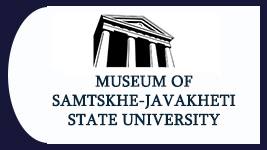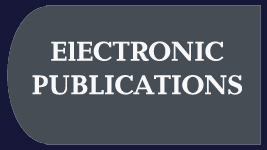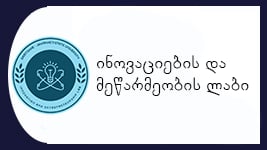LEPL Samtskhe-Javakheti State University aimed at extensive plans from the very beginning. Its establishment was based on the general public opinion initiated from the upcoming national movement.
Development path and achievements of Samtskhe-Javakheti State University have been created within 30 years of its establishment as a higher education institution. Students, graduates, employees and the community of the University are proud of the achievements and results that evolved as a result of the higher education foundation in Samtskhe-Javakheti region.
Today based on cooperation between different stakeholders the common space of scientific research, higher and vocational education and lifelong learning is created in the South of Georgia.
Samtskhe-Javakheti State University is one of the growing and progress-oriented regional universities in Georgia. Public expectations and trust of multiethnic population residing in the region towards the University are high. Its aim is to promote social, cultural and economic well-being in the society.
The University supports initiatives and activities of introducing European education and qualifications, actively participates in the Bologna process and is guided by the principles of the Great Charter on European Universities.
LEPL Samtskhe-Javakheti State University is a successor of the Akhaltsikhe Branch of Ivane Javakhishvili Tbilisi State University founded in Samtskhe-Javakheti as the first higher education institution in 1990. In 1991 ,,Independent University of Akhaltsikhe” was established on the basis of the existed branch which joined Akhaltsikhe Branch of Tbilisi State University as a paid educational department in 1995. In 2002 Akhaltsikhe Branch of Ivane Javakhishvili Tbilisi State University was named as Meskheti Branch of Ivane Javakhishvili Tbilisi State University.
In 2007 Independent Higher Educational Institution – Legal Entity of Public Law Akhaltsikhe Institute was established on the basis of Meskheti branch of Tbilisi State University according to the government resolution #161. LEPL Akhaltsikhe University has passed institutional accreditation and received the license of Higher Educational Institution in 2007. LEPL Akhaltsikhe Institute received the Status of Teaching University in 2009 and was named as LEPL Akhaltsikhe State Teaching University according to the government resolution #183. On December 14th, 2011 after the reorganization implemented at LEPL Akhaltsikhe State Teaching University its successor – Non-profit (Non-commercial) Legal Entity Akhaltsikhe State Teaching University was established according to the government resolution #476. On 3rd October, 2012 after the reorganization implemented on the basis of two educational institutions – Non-profit (Non-commercial) Legal Entity Akhaltsikhe State Teaching University and Akhalkalaki Higher Educational Institution – College Non-profit (Non-commercial) Samtskhe-Javakheti State Teaching University was established according to the government resolution #416. On 30th July, 2013 according to the government resolution #194 Non-profit (Non-commercial) Samtskhe-Javakheti State Teaching University was reorganized to LEPL Samtskhe-Javakheti State Teaching University. On 24th February, 2014 according to decision #8 of Higher Education Institution Accreditation Council LEPL Samtskhe-Javakheti State Teaching University was granted the status of a Higher Educational Institution – University. On April 4, 2014, according to the government resolution 3/272 LEPL – Samtskhe-Javakheti State Teaching University was reorganized into LEPL – Samtskhe-Javakheti State University. It is an autonomous state higher education institution. Georgian is a language of instruction at the university. The university also implements vocational programmes.
University life has become an integral part of Southern Georgia over the past period, so it is beyond doubt that the development of the University is a matter of principle for the region and in general, or our country.
The foundation of TSU Akhaltsikhe branch in the 1990s was a result of ongoing processes at the region such as development of the region, youth detention and the demographic imbalance that has emerged in this part of Georgia over the past two centuries.
Akhaltsikhe branch endured the tests of time when seven other educational branches founded by the State were liquidated.
The successful activities of Akhaltsikhe branch in 2002 led to the formation of the higher institution in Akhalkalaki. At the end of the twentieth century 3000 students were studying at TSU Akhaltsikhe branch, among them were students from Javakheti. Armenian population was an issue of special focus from the very beginning. Since 1995, intensive work has been carried out in order to open Georgian higher educational institution in Javakheti. For this purpose there were active negotiations with government heads of Akhalkalaki and Ninotsminda and the public sector. Based on the negotiations TSU Javakheti Branch was opened according to the decision of TSU Great Council in 2002. Opening of higher institution in Akhalkalaki was determined by Meskheti Branch in terms of personnel as well as psycho-moral factors.
The main aim of Javakheti Branch was preparation of personnel with Georgian-Armenian pedagogical background and economic education. There was a perspective for agricultural direction as well as the possibility to create the center for preparation and development of bilingual teaching. The creation of two educational institutions was a big step forward in this very important region of Georgia.
Based on the reorganization conducted by the Government of Georgia on 3rd of October, 2012 the University was established on the basis of the two institutions and now locates in two cities 70 km away from each other that determines the specificity of its life and existence.
The university has faced various challenges at various stages of its path, which were successfully overcome. After the authorization in 2012, the integration of two educational institutions (Akhaltsikhe State Teaching University and Akhalkalaki Higher Education Institution – College) was the main issue for SJSU. Changing status and reorganization into a college had an undesirable impact on TSU Javakheti Branch as most of the students left the college within a year and a number of remained students were only 28 when the college was joined with the Akhaltsikhe State Teaching University. SJSU management faced a serious problem – on the one hand it had to maintain the administrative staff that served the TSU Javakheti branch during the most difficult times (most of them were graduates of the TSU Meskheti branch), promoting its successful functioning and on the other hand, had to build the trust towards the reorganized university in order to attract the students in Akhalkalaki. The following important steps were taken – educational process was properly planned (specially were selected the following educational programmes – Georgian language training, economics and Bachelor in Georgian Philology), highly qualified faculty members were involved in the teaching process and the university provided daily transportation for them, serious financial resources were retrieved and the dormitory for students and professors was rehabilitated according to the modern standards, the President’s Foundation made it possible to purchase and install internet and to sum up, other important and timely events and activities were implemented. Each of these steps caused a serious impact that is proved by increased number of students to 193 today in Akhalkalaki Campus during the reporting period.
LEPL Samtskhe-Javakheti State University has an ambition to be a leader in teaching Georgian as a second language. There is a strong State language teaching school at SJSU. The first manuals for Armenian students were produced at the TSU Javakheti Branch with the financial support of Ministry of Education and Science of Georgia and OSCE High Commissioner on National Minorities at different times; moreover, the model which offers ethnic minorities one-year preparation programme in Georgian language before actual programme in specialty, was at the beginning implemented at TSU Javakheti Branch. The State realized and generalized the successful experience of SJSU. The number of entrants to the Georgian language preparation programme is increasing every year, the image of the university and the programme is high.
Samtskhe-Javakheti State University contributes to the development of teacher education. The university pays special attention to multicultural education. The result is in place. According to the teachers average age index in Georgia Samtskhe-Javakheti region has one of the youngest population in this regard which is ultimately the merit of the university. The university professors are actively involved in Georgia’s ongoing reforms (new school model), international projects (Tempus and Erasmus+) and the State programmes in the aforementioned fields. The university has a concept of multicultural education based on its own research, which fully reflects the specifics of Samtskhe-Javakheti, taking into account the realities of non-Georgian public schools. The concept was presented to the Ministry of Education and Science, publicly debated with international donors and, fortunately, found to be very close to the model offered by Estonian partners. The university also has the resources to be a leader in teacher education.
One of the turning points in the history of the university was the unprecedented case in Georgian educational space in 2014 when the university changed its status and became three-cycle higher educational institution – LEPL Samtskhe-Javakheti State University.
This fact has led to many novelties at the university. The existence of the third cycle of higher education – doctoral studies at the LEPL Samtskhe-Javakheti State University has made the research activities a priority in certain areas. The university’s primary area of scientific research is related to doctoral programmes, as it has created an opportunity for the university to prepare its own academic staff .
Raising the number of its own academic staff by the help of PhD programmes is a vital need for the university. It can be said without a doubt that it is impossible to discuss the university perspective in today’s competitive educational market without this need. Nevertheless, the university’s policy in defining doctoral programmes and research areas is cautious and realistic. The University has a clear vision that doctoral programmes should be implemented only in certain fields. In the direction that will meet two major requirements: the doctoral research will be based on and related to the needs of the region, will support scientific research of Samtskhe-Javakheti region and secondly, the university will have the relevant human, material-technical and financial resources to ensure the quality of research.
Given these circumstances, the priority areas of research that were specified are: the humanities and agrarian and economic sciences. A key feature of the research is its interdisciplinary nature.
Since 2014, the Doctoral Programme in Humanities has awarded qualification in the following three directions – History, Philology, and Ethnology. Due to the changes in regulations the programme was submitted for re-accreditation with only one qualification – Doctor in Humanities. During the accreditation process, a new qualifications framework came into force, ethnology was applied to the social sciences, and the syllabuses of the submitted programme appeared to be incompatible with the qualifications (Doctor in Humanities). The programme was denied accreditation. The recommendation was to dissolve the programme and independently submit each direction for the accreditation. In the nearest future, the University will again submit doctoral programmes in Georgian Philology and History for accreditation. For both programmes Samtskhe-Javakheti, historical Meskheti is a living research laboratory, potential areas of research are language contacts, ethnic, cultural, religious diversity, the results of historical coexistence and perspectives. Despite the fundamental nature of research, each has a serious practical purpose and is still being actively used. Serious steps are also being taken in this direction in terms of internationalization.
Kartvelology School in Frankfurt and Kartvelology Center in Greece are the partners of the University. Georgian professor working in Germany, is involved in the programme and Istanbul’s Georgian Catholics Monastery is the destination for the future research in framework of the programme. In 2015, the Turkish Historical Society, led by its President, visited Georgia for the first time in the framework of an international scientific seminar held at Samtskhe-Javakheti State University. There are active links with the universities of Armenia and Azerbaijan. The university has the resources to discuss all important issues, including controversial, in the light of science, and to conduct collaborative research with colleagues from partner universities.
Agriculture has a major share in the economy of Samtskhe-Javakheti region. Samtskhe-Javakheti is one of the most prominent regions in Georgia in terms of ongoing and planned pilot projects in the field of agriculture. University involvement in pilot studies is an organic and natural process and requires no special effort.
The future vision of the university incorporates developing of vocational programmes too. Infrastructure for this direction is already in the process of preparation. One of the criteria for selecting vocational programes is the prospect of developing higher education programmes in the same direction, which will diversify university-wide programmes and promote continuity of education.
Labor market research clearly points out one trend: Education programmes (law, foreign languages, information technology, business administration, artistic processing of wood, stone and metal, ecology, etc.) continue to function besides the areas listed above. Today there is a serious staff shortage in Samtskhe-Javakheti in areas where the university does not implement relevant programmes.
LEPL Samtskhe-Javakheti State University is located at three legal addresses: Akhaltsikhe (#113 Rustaveli street and #122 Rustaveli street) and Akhalkalaki (#119 David Agmashenebeli street).
The University is run by: Governing bodies, highly qualified academic, administrative, invited, supporting and other staff. The university implements programmes at all three levels of higher education, where the environment, material-technical base, private and public practice facilities, flexible tuition payment schedule ensure that the learning objectives are aligned with their outcomes.
LEPL Samtskhe-Javakheti State University is presented by the following four faculties:
- Education, Humanities and Social Sciences;
- Business Administration;
- Law;
- Engineering, Agrarian and Natural Sciences.
SJSU is particularly important for its social role in addition to being a strong educational hub in the region. This educational institution is the largest employer in the region, thereby responds to the region’s main challenge – to hinder migration processes and detain the population in Meskheti. Social contribution is an integral part of the activities of SJSU. Events that contribute to regional and community development are regular; a particular emphasis is on such activities that includes the socially vulnerable groups. For example, from 2015 Samtskhe-Javakheti State University provided free preparation courses for high school students wishing to enroll in HEI from families with low social economic status in Aspindza Municipality (in cooperation with Patriarchate); in Akhalkalaki the preparation courses were implementing for Georgian and Armenian entrants at the third campus of the university by the help of the President’s foundation. In both cases the entrants had the freedom of choice and they were not obliged to join SJSU. The Ninotsminda Children’s Home was not left out of university attention either.
Today academic education is already a reality in the region of Samtskhe-Javakheti. Intellectual community created at the university mostly consists from its graduate
ABOUT UNIVERSITY
- About us
- Mission
- Strategic plan
- Structure
- Functions of the structural units
- Business processes continuity management mechanisms and action plan
- Determination of the student contingent
- Election provision
- Management effectiveness monitoring mechanisms and evaluation system
- The Mechanisms of the resource and service development and updating of the scientific library
- Information technology management
- The Rule of affiliation of the academic personnel
QUALITY ASSURANCE
INFORMATION FOR
- VETPRO
- DITECH
- CIF-EEPIIQ
- ETHICS
- INTEGRITY
- Mechanism for evaluating the quality of research activities of academic staff and the results of the evaluation
- The Concept of research activities
- Joint research activities and cooperation with international partners
- Academic staff scientific productivity assessment system







